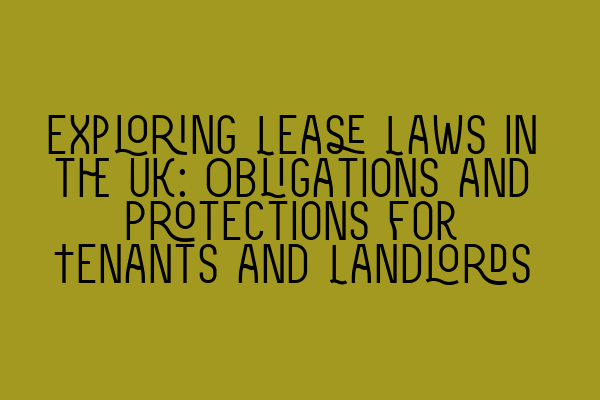Exploring Lease Laws in the UK: Obligations and Protections for Tenants and Landlords
Lease laws in the United Kingdom play a vital role in governing the relationships and responsibilities between tenants and landlords. Whether you are a tenant looking to rent a property or a landlord seeking to enter into a tenancy agreement, understanding lease laws is crucial to protect your rights and ensure a harmonious living or business arrangement. In this article, we will explore the obligations and protections provided by lease laws in the UK.
1. Rent and Deposit
A fundamental aspect of any lease agreement is the payment of rent. Rent represents the money paid by the tenant to the landlord in exchange for the right to occupy the property. Lease laws specify the amount of rent, the frequency of payment, and the consequences for late payment or non-payment of rent.
Additionally, lease laws in the UK also address the issue of security deposits. Landlords often require tenants to provide a security deposit to cover potential damages to the property or unpaid rent. These deposits must be protected by a government-approved tenancy deposit protection scheme to ensure that tenants’ money is safeguarded.
If you want to learn more about the obligations and protections related to rent and deposits, check out our related article on SQE Contract Law: Analyzing Landmark Cases and Influential Judicial Decisions.
2. Repairs and Maintenance
An important aspect of lease laws in the UK is the obligation of landlords to maintain their properties in a proper state of repair. Landlords have a legal duty to ensure that the property is safe, habitable, and free from any hazards that may endanger the tenant’s health or well-being.
Tenants also have certain responsibilities when it comes to repairs and maintenance. Lease agreements typically outline the tenant’s duty to report any necessary repairs promptly and to keep the property in a reasonable condition. Failure to uphold these responsibilities may result in legal consequences.
If you want to understand the rights and limitations related to repairs and maintenance, check out our related article on Understanding Contractual Capacity: Rights and Limitations.
3. Termination and Eviction
Lease laws govern the process of terminating a tenancy agreement and the eviction of tenants. Both landlords and tenants have rights and procedures they must follow to legally end a tenancy or remove a tenant from the property.
For example, if a landlord wishes to terminate a tenancy agreement, they must provide the tenant with sufficient notice as required by law. Similarly, tenants also have rights protecting them from unfair eviction practices.
If you want to enhance your knowledge of termination and eviction laws, check out our related article on Interactive SQE Mock Tests for Contract Law: Test Your Knowledge.
4. Discrimination and Equality
In the UK, lease laws prohibit landlords from discriminating against tenants on the basis of attributes such as gender, race, nationality, religion, or disability. These laws aim to ensure that all individuals have equal access to housing and are treated fairly by landlords.
Tenants also have the right to request reasonable accommodations to meet their specific needs, such as accessibility adjustments for individuals with disabilities. Lease laws require landlords to engage in a constructive dialogue with tenants to find suitable solutions.
If you want to delve deeper into the topic of discrimination and equality in lease laws, check out our related article on Join Our SQE Contract Law Webinars: Expert Insights and Guidance.
5. Dispute Resolution
Lease laws also provide mechanisms for resolving disputes that may arise between tenants and landlords. Dispute resolution processes, such as mediation or arbitration, can help parties find mutually acceptable solutions outside of the court system.
If a dispute cannot be resolved through alternative means, parties may resort to litigation. It is essential for both tenants and landlords to be aware of their rights and obligations when involved in a legal dispute.
For those seeking to enhance their knowledge of dispute resolution in the context of lease laws, check out our related article on SQE Prep: Mastering the Essentials of Contract Law.
Conclusion
Lease laws in the UK are designed to establish a fair and balanced relationship between tenants and landlords. Understanding the obligations and protections provided by lease laws is crucial for both parties to ensure a smooth and lawful tenancy.
If you require legal advice or assistance regarding lease laws, it is recommended to consult with a qualified solicitor who specializes in property law to guide you through the intricacies of the legal framework.
